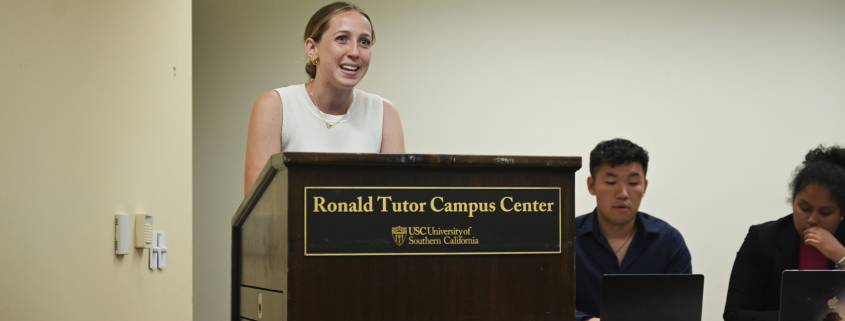USG introduces long-term goals for academic year

The Undergraduate Student Government discussed semester and year-long goals at Tuesday night’s senate meeting.
Chief programming officer Jillian Fallon started off the meeting by presenting programming goals aimed to engage more students at different stages of planning and attending events.
“For this semester, I want to give everyone a strong foundation to start off the year,” Fallon said. “Not only am I meeting with everyone one-on-one, but we also have weekly meetings through our programming department meeting or breakout at organization-wide meetings, just to make sure everyone’s on the same page.”
Afterwards, president Hannah Woodworth said that there was a lot of USG work being done over the summer to plan for the school year.
“We ran a lot of big ideas, but how can we tailor this and refine it to become something that is actually possible?” Woodworth said. “I’m determining what our advocacy initiatives were and what we thought would be feasible within this year, and then picking and prioritizing them…and really finding two or three core priorities that we want to say at the end of this year, we did it.”
Woodworth then presented the current projects that USG will work on, including providing a shuttle between USC and Los Angeles International Airport, which USG approved $63,000 in rollover funding this summer to pay and fund a pilot program for this year. They are still working to improve shuttle contracts, conducting qualitative interviews with registered student organizations and posting more frequently on their social media platforms.
“There’s a barrier to entry to get to LAX,” Woodworth said. “Oftentimes, Ubers are more expensive than your flight. We’re going to try and make sure that this is a collective effort that hopefully stays beyond this year.”
USG also plans to collect more information about the Interfraternity Council disaffiliation, meeting with student advocacy groups about student affordability and establish working relationships with Student Basic Needs. Additional plans include completing a qualitative analysis on the registered student organizations’ perception of USG, exhausting the USG fund to not have rollover, and increasing social media engagement by 15%.
“We want to do everything we can to support the organization and spend [the fund] to its fullest capacity,” Woodworth said. “[We want to] specifically support our programming branch to make it easy and accessible for them to use this fund.”
Vice president Nivea Krishnan announced the legislative branch’s annual goals, including increasing peer-to-peer communication such as the tabling events that senators will begin next week on Trousdale Parkway to expand accessibility for students outside of USG and establish USG as the go-to for student services and university resources.
“This past week, we have senators who have been doing an initiative where we’ve been going into classes,” said senator Maria Barun. “We’ve been reaching out to past professors that we have a connection with, and just saying, ‘Can you give me two minutes at the start of your class so I can introduce myself and give students my email and to reach out if they have any questions?’”
USG’s active external projects also include workshops with the Gould School of Law to put together a training series on student tenant rights and how to navigate the housing process, establishing a clear network for RSOs to resolve internal disputes about Relationship and Sexual Violence Prevention and Diversity, Equity and Inclusion, administrative roundtables for groups to discuss with administrators to discuss important campus issues and launching a new meal swipes donation program by workshopping a new version of Trojans Give Back.
“[The meal swipe donation program] is something that we had a really good version of last year,” Krishnan said. “We raised over $12,000 via that program for students in need, but they did change the meal plans so we’re going to have to rework that. USC dining has been very receptive in the past, so we’re hoping that this semester we can redesign the program.”
Chief diversity officer Zaid Diaz-Arias presented goals to expand recruitment, implement diversity training, ensure equity in the budget, expand advocacy and amplify the advocacy department’s role.
“I aim to be the principal architect of USG’s diversity, equity and inclusion plans and programs,” Diaz-Arias said. “The advocacy department was created because we wanted to alleviate the extra responsibility on the assemblies to focus on advocacy at the same time that they’re focusing on programming.”
The budget was restructured to make sure that funding is distributed fairly, and students who are a part of RSOs will be able to attend a funding workshop Wednesday, Sept. 7 at 6 p.m. to learn about the funding department and how their organizations can get financing. More information about the workshops will follow on their Instagram.
“The mission of the funding department is to promote community development, personal growth and organizational trust through transparent investments and equitable access to opportunity,” chief financial officer Brian Stowe said.

